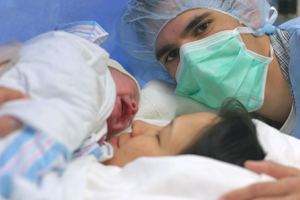A new tool has been invented to help deliver babies. The inventor is not a physician or a nurse or even a mom—he is a car mechanic. This unlikely inventor of a new highly-praised medical device is a 59 year-old from Argentina, Jorge Odón.
The Odón Device, its official name, helps women who experience an obstructed labor. This type of labor is usually caused when contractions stop during mid-labor or when a newborn’s head is larger than the mother’s birth canal.
The World Health Organization (WHO) has endorsed the new device. The organization’s chief coordinator for improving prenatal health, Dr. Mario Merialdi, told the New York Times he is excited because there has not been much advancement in this area for years.
Odón was inspired after watching a YouTube video showing the removal of a cork after it had fallen into a full wine bottle. The device involves sliding a plastic bag around the child’s head, inflating the bag, and finally gently pulling until the baby appears and makes its way through the birth canal.
The two tools physicians currently use, forceps and section cups, to help pull the baby through the birth canal are not ideal because there is risk of hemorrhages and injury to the child’s spine or skull.
One of the more common results of using forceps for example is the accidental removal of a piece of the ear. When you encounter someone who has a nick in the top of the ear, chances are forceps were used during birth and are responsible for the missing piece.
Physicians believe the Odón Device may decrease the number of cesarean sections performed in wealthy nations, and may also reduce the infant and mortality rates in poor countries.
The new tool is currently in its testing phase. The first successful test involved 30 women in Argentina who had all given birth before and were all having normal births in a hospital.
More tests are up-coming. The World Health Organization will oversee clinical trials when the device will be tested on 100 women with normal labor in India, China and South Africa. The following trial will test the device on 170 women who experience obstructed labor.
Other support for the Odón Device has come in the form of research grants from both the US Agency for International Development and Grand Challenges Canada. Becton, Dickinson and Company of Franklin Lakes, N.J., will undertake manufacturing the device.
This exciting new device shows promise in improving the options during obstructed labor. As the Odon Device makes its way through clinical trials, it will likely help the safe delivery of many babies. Once the trials conclude, the device will likely become available at all hospitals and pregnancy care facilities.



